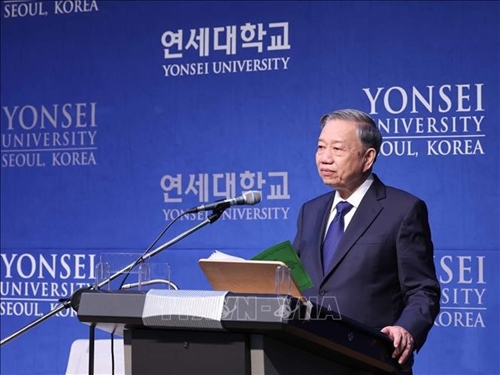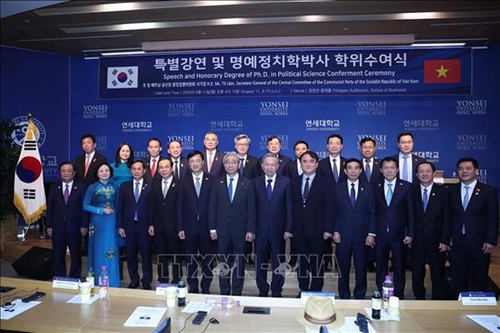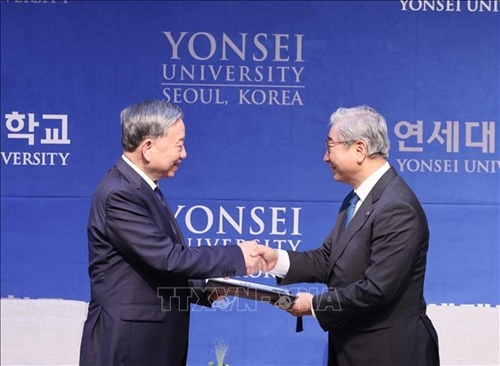His address focused on strengthening connectivity and trust, advancing the Vietnam-RoK comprehensive strategic partnership for peace, prosperity, cooperation, and development.
Speaking at the 140-year-old school, widely regarded as a symbol of Korean intellect and strength, Party chief To Lam praised the university’s track record of producing many distinguished alumni, including scientists, writers, film directors, actors, athletes, doctors, and politicians.
    |
 |
|
Party General Secretary To Lam delivers a keynote address at Yonsei University. |
He voiced his pride and confidence that future graduates would follow their predecessors’ footsteps, studying hard, working diligently, and sharing with the world the message of a nation rich in tradition and a young generation full of enthusiasm, courage, creativity, and dedication.
In his speech, he also outlined Vietnam’s perspectives on the global and regional landscapes, highlighting their direct impacts on security, development, and bilateral relations. He pointed to a global economic environment marked by hidden risks, potential fragmentation, disrupted production and supply chains, and growth models still heavily reliant on limited inputs such as natural resources, capital, and traditional labor, which have left many countries struggling to adapt and transform.
In the face of both epochal opportunities and challenges, Vietnam is striving to usher the nation into a new era - the era of prosperity, strength, and development. With confidence in the country’s bright future, drawing on the traditions passed down by previous generations and inspired by the remarkable progress of friends such as the RoK, Vietnam is demonstrating strong resolve to create new milestones on its path toward the future, he said.
Outlining Vietnam’s development orientation to 2030 with a vision to 2045, the General Secretary noted that in the 80 years since its founding, particularly nearly four decades of Doi Moi (Renewal) under the leadership of the Communist Party of Vietnam, the country has recorded historic achievements. From a war-torn, impoverished, and embargoed nation, it has transformed into a dynamic emerging economy which leads ASEAN in foreign investment attraction and trade volume.
Promoting the shared spirit of East Asian nations and inheriting a tradition of harmony and benevolence, Vietnam remains steadfast in its “four no’s” defense policy, including no military alliances, no siding with one country against another, no foreign military bases on Vietnamese soil, and no use or threat of force in international relations.
Vietnam firmly supports the peaceful settlement of disputes and disagreements based on the United Nations Charter and international law, he said, adding that always stays ready to serve as a bridge for cooperation and dialogue, act as a sincere and loyal friend, a trusted partner, and an active and responsible member of the international community.
The Party chief stressed that the current decisive phase holds strategic significance in realizing Vietnam’s major aspirations: becoming an upper-middle-income developing country with modern industry by 2030 when the Communist Party of Vietnam marks its centenary; and a high-income developed nation by 2045, on the occasion of the 100th anniversary of the nation’s founding. On this journey, Vietnam hopes the RoK’s Government and people will continue to accompany, support, and assist its efforts, he said.
Reflecting on Vietnam-RoK relations and future directions for bilateral cooperation, the Vietnamese guest noted that diplomatic ties were established in 1992. In just 33 years, the bilateral friendship and cooperation have grown at an unprecedented pace in their history, with both sides becoming trusted partners, close friends, and strategic collaborators who share mutual understanding.
    |
 |
|
The Vietnamese delegation and Yonsei University staff |
Looking ahead, he outlined several key orientations, such as strengthening political trust and mutual understanding as the foremost foundation for deepening the Vietnam-RoK comprehensive strategic partnership in a more substantive and effective manner. To this end, the two countries should maintain regular exchanges at all levels, especially high level, across the Party, State, Government, National Assembly, and people-to-people channels; expand cooperation in diplomacy, national defense-security, economy, and sci-tech; and effectively realize existing cooperation mechanisms and agreements.
Promoting the central role of economic-trade cooperation as a top priority, the Party chief said Vietnam views the increased and expanded investment by Korean enterprises in key sectors and the development of specialized industrial production complexes along the value chain in Vietnam as bringing strategic mutual benefits for both countries.
Cooperation projects with the RoK in strategic transportation infrastructure, energy infrastructure, digital infrastructure, and climate-resilient infrastructure will strengthen Vietnam's infrastructure resilience, he stressed.
The General Secretary stated that in the time ahead, the two countries should elevate cooperation in science and technology, innovation, digital transformation, and human resource development to make them new pillars of bilateral relations.
There should also create breakthroughs in cultural, tourism, educational and labor cooperation, and people-to-people exchanges; collaborate closely in multilateral and international mechanisms and forums; and promote joint efforts in building and upholding a rules-based international order with the United Nations at its core.
General Secretary To Lam recalled that President Ho Chi Minh once placed great trust and expectations in the younger generation, as reflected in his writing: "A year begins in spring. A life begins in youth. Youth is the spring of society."
He stressed that young people are symbols of readiness to take on challenges, enthusiasm and boldness; of strong will, undaunted by hardship in pursuit of their ambitions and dreams; and also of sharp intellect and creativity in grasping science, technology, and new knowledge.
“Nurtured and growing up in the digital and globalized era, with early access to the achievements and values of humanity in all fields from economy and culture to science and technology, the young generation of both countries, including the students present here today, will inherit and continue the proud traditions of their forefathers. They are the backbone and decisive force for national prosperity,” he noted.
The General Secretary affirmed that young people are also the pioneering, core force in fostering an increasingly strong relationship between the two countries.
He expressed his hope that Vietnamese students studying in the RoK in general and at Yonsei University in particular will serve as "goodwill ambassadors" of the Vietnamese people, all aspiring to become key contributors to the flourishing development of Vietnam-RoK relations.
    |
 |
|
Professor Yoon Dong Sup, President of Yonsei University, presents an honorary doctorate degree to General Secretary To Lam (left). |
These contributions will be practical and meaningful in building a stronger and more beautiful Vietnam as President Ho Chi Minh once wished, he added.
With a long-standing relationship nurtured by generations of people and leaders from both countries, combined with determination, creativity, internal strength, and the close ties among businesses, citizens, especially the younger generation, Party leader To Lam expressed his belief that Vietnam and the RoK will fully harness their similarities, grow ever closer, and together achieve success for peace, prosperity, cooperation, and development in both nations, the region, and the world.
On this occasion, Professor Yoon Dong Sup, President of Yonsei University, presented an honorary doctorate degree to General Secretary To Lam.
Source: VNA